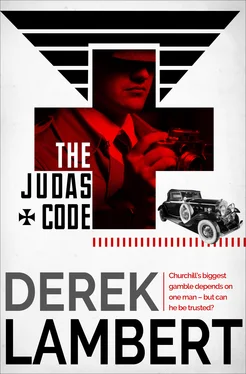The doubts that had reached Viktor in the forest dissolved. Ordinary people wouldn’t have been able to enjoy themselves like this before 1917. Possessively, Viktor, lover and philosopher, took Anna’s arm.
‘But do you?’ She must have been talking while he savoured the fruits of socialism. Impatiently, she said: ‘You haven’t been listening, have you?’
‘I don’t want to hear anything more about purges.’
She pulled her arm away. ‘Of course you don’t. You don’t want anything to interfere with your beautiful, cossetted life. Least of all truth.’
‘I don’t believe it is the truth.’ Her attitude nettled him. ‘Let’s go and have a beer.’
They sat at a scrubbed wooden table and drank beer from fluted brown bottles. Around them families ate picnic lunches and guzzled; in one corner a plump mother was feeding a baby at the breast.
‘I was asking,’ she said, ‘when you weren’t listening, that is, whether you would like to see proof of what I’ve been saying.’
‘If it will please you.’
‘Please me!’ She leaned fiercely across the table. ‘It certainly won’t please me. But it will give me a certain satisfaction to see that smug expression wiped off your face.’
‘Not so long ago my eyes were always searching for the truth …’
‘In everything except politics.’
‘What you’re alleging is more than political.’
‘I can’t understand how you’re so blind. Everyone knows that Stalin is killing off all his enemies, real and imagined. They say the army is powerless now because he’s murdered all the generals.’
Some of the men and women sharing the long table were looking curiously at them. ‘Keep your voice down,’ Viktor whispered, covering her hand with his to soften the words, knowing that any moment now she would accuse him of cowardice.
‘I will for your sake,’ which was the same thing. ‘We don’t want you thrown into Lubyanka, do we?’
A man with a walrus moustache who was peeling an orange pointed his knife at them and said: ‘Cell 28. I spent three years there. Give my love to the rats.’
Viktor said: ‘You see, everyone can hear you even when you lower your voice.’ He felt faintly ashamed of his caution; but really there was no need to: if she had been speaking the truth then, yes, he would have sided with her.
‘Am I to speak in whispers all my life?’
He thought: Yes, if I’m to share my life with you. But the possibility was becoming less attractive by the minute; he seemed to have expended a lot of ideals with his sexual passion.
The man with the walrus moustache bit into his orange and, with juice dribbling down his chin, sat listening. The woman in the corner transferred the baby to her other plump breast.
Viktor said: ‘There are a lot of informers about. Even I admit that.’
‘I suppose you think they’re a necessary evil.’
He thought about it and said: ‘Frankly, yes I do,’ waiting for her voice to rise another octave.
Instead she spoke softly. ‘I meant what I said, Viktor. I will show you the proof of what I say. Or rather I will arrange for you to see it.’
The man with the walrus moustache frowned and edged closer, evidently believing that he had qualified to take part in the conversation.
Viktor tilted the bottle, drained it and wiped the froth from his lips. ‘Make the arrangements,’ he said.
‘What arrangements?’ asked the man with the walrus moustache. He spat out an orange pip. ‘I remember there was one rat who got quite tame. I called him Boris.’
‘Let’s get out of here,’ she said.
Without speaking, they made their way along the dusty path beside the river. The bushes to their right were the changing quarters and from behind them came shrieks and giggles, the smack of a hand on bare flesh.
As they neared the bus terminal she said: ‘You know Nikolai Vasilyev?’
‘Your private tutor? I know of him. Isn’t he supposed to be a great admirer of Trotsky?’
‘He believes Stalin cheated him. He also believes that one day Stalin will murder him.’
‘Another of your psychopaths by the sound of it.’
‘He’s a very fine man,’ Anna said and from the tone of her voice Viktor guessed that he was, or had been, her lover.
‘Does he teach you Trotsky’s theories?’
‘Sometimes when our sociology lesson is finished he talks about what he believes in. The dreams that peasants dreamed before Stalin made nightmares out of them.’
Exasperated, Viktor punched the palm of one hand with his fist and said: ‘This proof. Tell me about it.’
‘Nikolai’s best friend is an army officer, a captain. The captain’s father was a general.’
‘Was?’
‘He was executed by a firing squad along with thirty other officers. His crime – he questioned the disposition of Soviet troops on the eastern borders. He was proved right when the troops clashed with the Japanese at Manchukuo ten days ago. But the fact that he was right merely made his crime worse.’
‘Perhaps he was executed for treason. Or treasonable talk,’ Viktor said.
Anna ignored him. ‘Nikolai knows where the executions take place. And he will know through his friend when the next one will be. For all I know they take place every day,’ she added.
‘In the imagination of Nikolai Vasilyev and his friend.’
‘There’s only one answer: you must see for yourself. If you have the stomach for it.’
Then he couldn’t refuse.
*
In the red and white coach packed with Muscovites radiating heat from their sun-burn Viktor considered Anna’s jibes about his privileged upbringing. In fact it had bothered him long before she had mentioned it.
He had been born in 1920 when the Red Army was still fighting its enemies in the civil war that followed the Revolution. There were many orphans in those days but not many who had the good fortune to be farmed out almost immediately to a respectable but childless young couple.
Viktor stood up to give his seat to a pregnant woman who had pushed her way through the strap-hanging passengers. The bus bounced as the hard tyres passed over pot-holes in the roads, but at least the crush of bodies stopped you from falling.
From what he had subsequently gathered the Golovins had become remarkably self-sufficient in the dangerous, disordered streets of Moscow. They had found a small house in a relatively tranquil suburb; his father had been given a job at the library where he helped Bolshevik authors re-write history; his mother had devoted herself to the upbringing of little Viktor.
In photographs he looked an uncommonly smug child, scrubbed, combed, smiling complacently at the cameraman. It was a paradox that such self-assurance should have led to the self-doubts he was experiencing now.
It wasn’t until he was sixteen that his father had told him that he was adopted. And it was only then that he began to question the uneventful security of his life.
To the inevitable question: ‘Who were my parents?’ his father, bearded and patient, replied, ‘We don’t know. There were thousands of children without parents in those days. You see it wasn’t just the men who were killed in the Revolution and the fighting after it: women fought side by side with them.’
‘But how did you find me?’ Viktor asked.
‘We didn’t find you. You were allocated to us. We knew by this time that my wife, your mother … foster mother? … no, let’s always call her your mother … we knew that she couldn’t have a child so we went to an orphanage. You had been taken there by an old woman who left without giving any details about your background. Perhaps she didn’t know them; perhaps she was your babushka ; we shall never know.’ His father put his hand on Viktor’s shoulder. ‘But we do know that we were very lucky.’ A pause. ‘And I think you were very lucky too.’
Читать дальше












